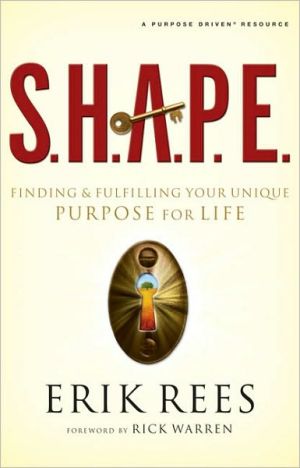

 |

|

The average rating for S.H.A.P.E.: Finding and Fulfilling Your Unique Purpose for Life based on 2 reviews is 3.5 stars.
Review # 1 was written on 2017-05-18 00:00:00 Jonne Shepler Jonne SheplerAfter reading this book, i got a deeper insight on how to live a life of purpose, and also channel my gifts to a reasonable cause. |
Review # 2 was written on 2018-05-25 00:00:00 Martha Elizalde Martha ElizaldeI had something of a love/hate relationship with this book. I got it as research material for a book I am writing about Spiritual gifts. I have taken a lot of classes at various churches which have adapted materials from this resource, so I decided to check it out. I was both delighted and disappointed for several reasons. First, this book is written to serve multiple purposes. You can use it for personal study, as I did, work through it with a group, or use it to disciple someone one-on-one. There are questions at the end of each chapter and in the back of the book to help you review and apply what you read right away. It's also chock full of quizzes, questionnaires and diagrams that help you analyze your unique S.H.A.P.E. and determine what sort of ministry you are designed to do. S.H.A.P.E. is an acronym first coined by Rick Warren, famous for his bestseller, The Purpose Driven Life. It stands for Spiritual gifts, Heart, Abilities, Personality and Experiences. It's a nice way to help people think about and analyze their individual characteristics that God has invested in them for ministry. Second, I like that Erik Rees emphasizes that all of these characteristics are what equip you for service to others. We need to have servant hearts that are focused on glorifying God and meeting the needs of others, rather than vying for attention and accolades for ourselves. He emphasizes the importance of working with a team of believers to figure out what you were designed to do and then carry it out for God's glory. I wholeheartedly agree with what he says to pastors and church leaders in one of the helpful notes in his appendices in the back: "The Bible clearly tells you and me in Ephesians 4 that we need to be the administrators and let the members be the ministers..." There are too many paid professional Christians that are burning themselves out trying to be all things to all people in our churches, when God never intended for them to be the ministers and the rest of us mere spectators or consumers. My main problems with this book are that, while his intentions are noble, the author bases some assumptions and teaches some ideas from questionable sources. Quite frequently, Rees quotes from The Message paraphrase and the New Living Translation of the Bible. These versions often misinterpret or distort the meaning of Scripture. He also quotes passages out of context, making it sound like they are saying something they do not (e.g.--Romans 12:6a, as used on pp. 67 & 69). He quotes from Wilferd Peterson, a proponent of "New Thought," a belief system that purports that we are all part of a "universal mind" and that humans have the potential of becoming one with the impersonal life force at work in the cosmos (p. 81). In chapter 5, he talks about personality theories that originated in ancient astrology. Secondly, having studied Spiritual gifts extensively, it is frustrating to see Erik Rees confuse qualities commanded of all believers (e.g.--hospitality) and ministry roles in the church (i.e.--apostleship, evangelism and pastoring) as Spiritual gifts. There are 15 charismata listed in three main passages about Spiritual gifts in the New Testament, and we don't need to add other things to the list. He also defines some of the gifts in ways that make it sound like these are run-of-the-mill abilities that even non-believers can manifest. Knowledge, for example, is something God tells you that you couldn't naturally know about a person or circumstance; not mere book-learning. Finally, from start to finish, the author touts Rick Warren's book and various other resources produced by Saddleback Church. I felt like I was reading a printed infomercial half the time, rather than a helpful study guide. While I appreciate Erik Reese sharing the things he's learned about getting people plugged into ministry, I really don't think it's appropriate to be plugging his products all the way through. For these reasons, I can only half-heartedly recommend this book, with the following reservations: 1) Don't give this to a new baby Christian. There's too much sketchy information in it, and they won't have the maturity or discernment to ferret it out. 2) When used as a group study, make sure you have at least one mature Christian in the group to explain and clarify the truth. 3) Have a good, solid translation of the Bible (e.g.--ESV, NASB, NKJV, NIV, etc.) handy, and look up what the Bible REALLY says in any instance that The Message or NLT are quoted. 4) Don't let this be the ONLY resource you reference when studying Spiritual gifts, ministry, etc. Check out books by Cindy Jacobs, Derek Prince and others. |
CAN'T FIND WHAT YOU'RE LOOKING FOR? CLICK HERE!!!